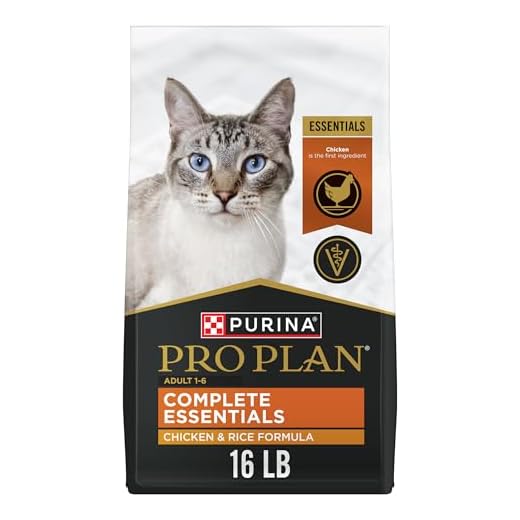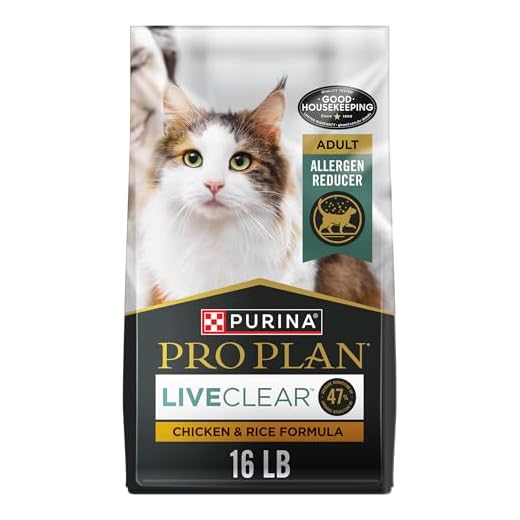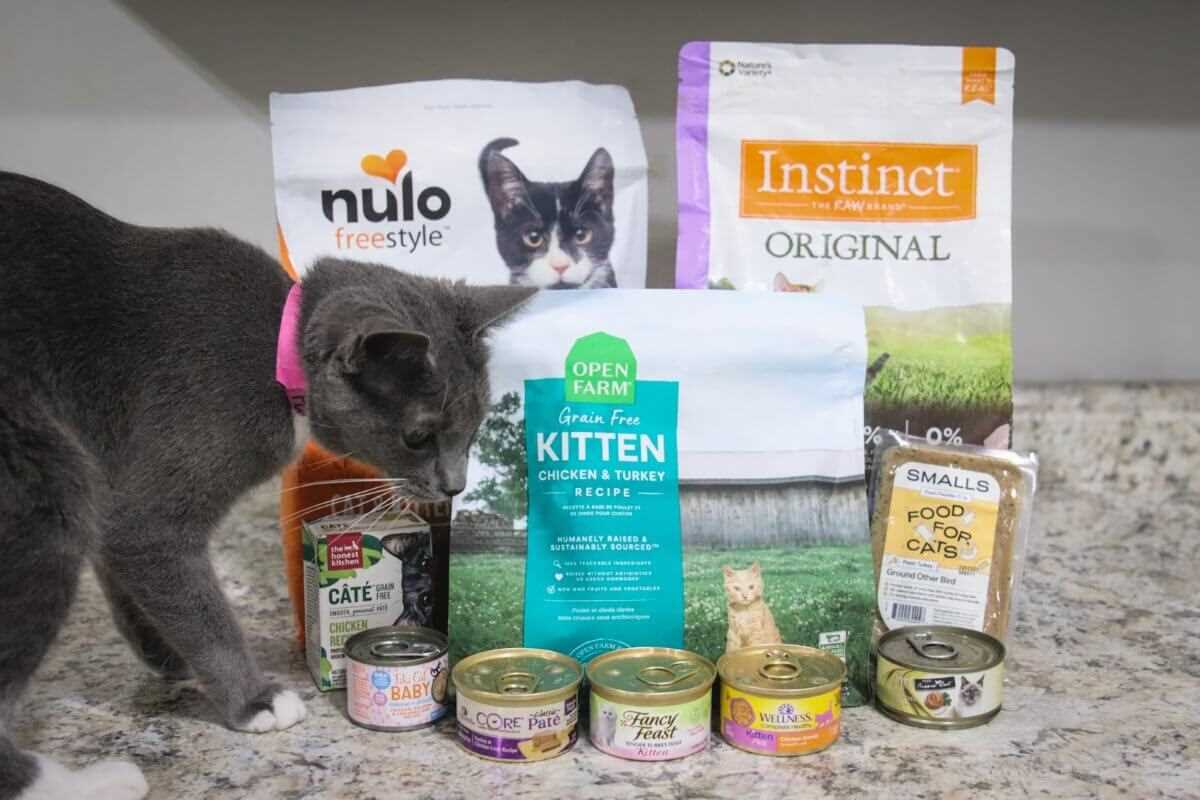




Opt for high-protein meals featuring real meat as the primary ingredient to ensure optimal health for your four-legged companions. This article provides insights into the most suitable nourishment for both adult felines and young ones, highlighting the significance of age-appropriate choices, nutritional requirements, and ingredient quality.
The information shared here is designed for pet owners seeking to enhance their pets’ diets or those considering adopting a new furry family member. You will discover specific dietary needs for various life stages, the impact of different ingredients, and recommendations for commercial products that meet these criteria.
By the end of this piece, you’ll have a clearer understanding of how to select nourishing options that support growth, energy, and overall well-being, ensuring that your pets thrive at every stage of their lives.
Best Nutrition Choices for Felines
High-quality protein sources are fundamental for the well-being of your furry companions. Look for options that list real meat as the primary ingredient, ensuring adequate amino acids are provided for muscle maintenance and overall health.
Avoid excessive fillers like corn and soy that offer little nutritional value. Instead, select products enriched with essential fatty acids, vitamins, and minerals to support skin, coat, and immune system health.
Key Nutritional Components
- Proteins: Vital for growth and energy, derived from meat or fish.
- Fats: Important for energy and skin health, sources include chicken fat or fish oil.
- Carbohydrates: While not essential, moderate amounts from vegetables can provide energy.
- Vitamins and Minerals: Crucial for various bodily functions; ensure a balanced intake.
Hydration plays a significant role in your pet’s health. Wet varieties of nutrition can help maintain moisture levels, particularly beneficial for those who may not drink enough water.
It’s advisable to consult with a veterinarian to tailor the dietary plan according to the specific needs of each animal, considering factors such as age, weight, and activity level.
Essential Nutrients for Feline Health
Providing a balanced diet is fundamental for maintaining the health of felines. Key nutrients play a significant role in supporting their overall well-being and longevity. Understanding these components helps ensure that your pet receives the proper nutrition needed for growth, energy, and a strong immune system.
Proteins serve as the building blocks for muscle development and tissue repair. Cats require a higher percentage of protein compared to many other animals, as it is vital for their metabolic functions. It’s advisable to include high-quality animal proteins in their meals to meet their specific dietary needs.
Key Nutrients
- Proteins: Essential for growth, maintenance, and repair of tissues.
- Fats: Provide energy and support cell structure, with omega-3 and omega-6 fatty acids being particularly beneficial for skin and coat health.
- Vitamins: Important for various bodily functions. Vitamin A supports vision and immune health, while B vitamins are crucial for energy metabolism.
- Minerals: Calcium and phosphorus are necessary for strong bones and teeth, while taurine is vital for heart health and reproductive function.
- Water: A critical nutrient for hydration, digestion, and overall health; always ensure fresh water is available.
Each of these nutrients contributes uniquely to the health of your feline companion. A balanced intake helps prevent deficiencies and supports bodily functions that are crucial for a long, healthy life.
Commercial Brands Reviewed
When selecting a suitable meal for your feline companion, consider the nutritional value and ingredient quality. Many commercial brands offer a variety of options tailored to specific needs, ensuring your pet receives balanced sustenance.
Reviewing several brands reveals significant differences in formulation, sourcing of ingredients, and overall quality. Some producers prioritize natural components, while others focus on veterinary diets aimed at specific health issues.
Ingredient Quality and Sourcing
High-quality brands often emphasize real meat as the primary ingredient. This ensures that your pet receives adequate protein, which is essential for muscle development and overall health. Additionally, some companies source their ingredients from sustainable farms, reflecting a commitment to environmental responsibility.
- Meat Sources: Look for named meats such as chicken, turkey, or fish as the first ingredient.
- Grain vs. Grain-Free: Some formulas are grain-free, catering to sensitivities, while others incorporate whole grains for energy.
- Additives: Check for beneficial additives like omega fatty acids for coat health and taurine for heart function.
Formulations for Specific Needs
Brands often provide specialized diets, addressing various life stages or health conditions. For instance, options for growth in young felines or formulations aimed at weight management for adults are widely available.
- Growth Formulas: These are rich in protein and fat to support development.
- Weight Management: Designed with fewer calories and higher fiber to promote satiety.
- Health-Specific Diets: Offer solutions for issues like allergies or urinary tract health.
Choosing the right product involves assessing your pet’s unique needs and preferences. Consulting with a veterinarian can provide personalized guidance to ensure optimal nutrition for your furry friend.
Homemade Recipes for Nourishing Kittens
A balanced mixture of proteins, fats, and carbohydrates is crucial for the growth of young felines. Homemade meals can provide the necessary nutrients without additives. One simple recipe includes cooked chicken, rice, and a small amount of vegetables.
Combine shredded chicken breast with cooked rice and finely chopped carrots. Ensure that all ingredients are well-cooked and blended. This mix can be served warm and should be consumed within a few hours to maintain freshness.
Another Nutritious Option
A blend of fish and potatoes can offer essential omega-3 fatty acids. Boil a piece of salmon or tuna and mash it with boiled potatoes. Adding a little vegetable broth can enhance flavor and moisture.
Always ensure that any fish served is boneless and well-cooked. This mixture can be stored in the refrigerator for up to two days.
- Cooked chicken breast, shredded
- Cooked rice
- Chopped carrots
- Cooked salmon or tuna
- Boiled potatoes
- Vegetable broth
When preparing meals, avoid using seasoning or additives that may be harmful. Fresh water should always be available alongside homemade dishes.
Understanding Your Cat’s Dietary Needs by Age
Nutrition varies significantly throughout the life stages of a feline companion. Young felines require specific nutrients to support their rapid growth and development, while mature animals have different requirements to maintain health and vitality.
For young ones, a diet rich in protein and essential fats is crucial. This ensures proper muscle development and a healthy coat. Choose options that list high-quality meat as the primary ingredient and contain adequate levels of vitamins and minerals.
Dietary Needs in Different Life Stages
As felines grow, their dietary needs evolve:
- Kitten Stage (0-12 months): Nutrient-dense options are necessary. Look for products with high protein content, DHA for brain development, and calcium for bone growth.
- Adult Stage (1-7 years): Balance is key. Maintain a diet that supports energy levels without excessive calories. Regular monitoring of weight and activity can help adjust portion sizes.
- Senior Stage (7 years and older): Focus on easily digestible ingredients. Reduced calories and increased fiber can help manage weight, while joint support supplements may be beneficial.
Always consult a veterinarian to tailor nutrition to specific health needs, particularly for older felines with conditions that may require dietary adjustments.
Common Allergies and Intolerances in Felines
Identifying specific sensitivities in your pet can significantly improve their quality of life. Common allergens include proteins, grains, and certain additives, which may lead to adverse reactions.
If your furry companion exhibits symptoms such as itching, gastrointestinal upset, or respiratory issues, it may be time to evaluate their diet. Consulting a veterinarian is advisable for proper diagnosis and management.
Common Allergens
- Beef: A frequent cause of allergies; can lead to skin irritations and digestive problems.
- Dairy Products: Many felines are lactose intolerant, causing upset stomach and diarrhea.
- Fish: While often enjoyed, some individuals may react negatively.
- Chicken: Another common protein that can trigger sensitivities.
- Grains: Wheat and corn may cause gastrointestinal issues in some pets.
Recognizing Symptoms
Watch for signs such as:
- Itchy or inflamed skin
- Excessive grooming
- Vomiting or diarrhea
- Ear infections
- Respiratory problems
Management Strategies
To address dietary intolerances, consider the following:
- Elimination Diet: Gradually remove potential allergens to identify triggers.
- Hypoallergenic Options: Select specialized formulas designed for sensitivities.
- Consultation: Regular discussions with a veterinary professional can ensure optimal health.
Understanding allergies and intolerances in your pet is crucial for their well-being. Proactive management can lead to a healthier and happier life for your furry friend.
Best food for cats and kittens
Features
| Part Number | 21012 |
| Model | 21012 |
| Warranty | Solid Gold does not warranty product sold through unauthorized resellers as it could be tampered with, expired, stored improperly, transferred improperly, or counterfeit. |
| Color | Chicken & Egg |
| Size | 12 Pound |
Features
| Part Number | 800286 |
| Model | 70 |
| Warranty | If you have a question that needs immediate attention, please call (800) 919-2833. |
| Color | Brown |
| Size | 11 Pound (Pack of 1) |
Features
| Part Number | 038100131546 |
| Model | 13154 |
| Warranty | Purina guarantees outstanding quality and taste. If for any reason you’re not satisfied, simply let Purina know why. Please contact Purina directly at (800) 778-7462 within 60 days of date on receipt for assistance. Or, feel free to mail your original purchase receipt with the price circled, a brief explanation of why you were dissatisfied with our products, the “Best If Used By” date box from the package, along with your name and street address (P.O. Box not accepted) to: Purina, Consumer Services, PO Box 340, Neenah WI 54957 |
| Release Date | 2022-02-24T00:00:01Z |
| Size | 16 Pound (Pack of 1) |
| Publication Date | 2011-12-21T00:00:01Z |
Features
| Part Number | 9392 |
| Model | 9392 |
| Color | White |
| Release Date | 2012-09-27T00:00:01Z |
| Size | 15.5 Pound (Pack of 1) |
Features
| Part Number | 038100186034 |
| Model | 00038100186034 |
| Color | Other |
| Release Date | 2022-03-25T00:00:01Z |
| Size | 16 Pound (Pack of 1) |
Features
| Part Number | 50111 |
| Model | 50111 |
| Release Date | 2007-10-30T00:00:01Z |
| Size | 5.5 Ounce (Pack of 24) |
Video:
FAQ:
What are the best types of food for kittens?
Kittens require a diet that supports their rapid growth and development. Look for high-quality commercial kitten food that contains a good balance of proteins, fats, and carbohydrates. Wet food is beneficial for hydration and can be more appetizing for young cats. It’s important to choose products specifically formulated for kittens, as their nutritional needs differ from adult cats. Ingredients like chicken, turkey, and fish are great protein sources, and foods enriched with vitamins and minerals will help support their overall health.
How often should I feed my cat or kitten?
Feeding frequency can vary based on the age of your cat or kitten. Kittens typically need to eat more frequently due to their high energy needs; feeding them three to four times a day is advisable. As they grow into adulthood, you can transition to two meals per day. Adult cats generally do well with two meals a day, but some owners prefer to leave dry food out for free feeding. Always ensure fresh water is available at all times, regardless of the feeding schedule.
Can I feed my cat homemade food?
Yes, you can prepare homemade food for your cat, but it requires careful planning to ensure it meets their nutritional requirements. Cats are obligate carnivores, meaning they need certain nutrients found only in animal products. A balanced diet for cats should include proteins, essential fatty acids, and specific vitamins and minerals. Consulting with a veterinarian or a pet nutritionist is recommended to create a safe and complete homemade diet, as improper nutrition can lead to health issues.
Are there any foods that are harmful to cats?
Yes, certain foods can be toxic to cats and should be avoided. Common harmful foods include chocolate, onions, garlic, grapes, and raisins. Additionally, alcohol and caffeine are also dangerous. Even small amounts can cause serious health issues. It’s crucial to be aware of these and to keep these items out of reach. If your cat accidentally ingests something harmful, contact a veterinarian immediately for advice.
How do I choose the right commercial cat food brand?
Choosing the right commercial cat food brand involves looking for high-quality ingredients and a good nutritional balance. First, check that the food meets the standards set by the Association of American Feed Control Officials (AAFCO). Look for specific protein sources as the first ingredient and avoid foods with excessive fillers like corn and wheat. Reading reviews and seeking recommendations from veterinarians can also guide you in selecting reputable brands. It’s also helpful to monitor your cat’s health and energy levels after switching foods to ensure they are thriving on the new diet.










